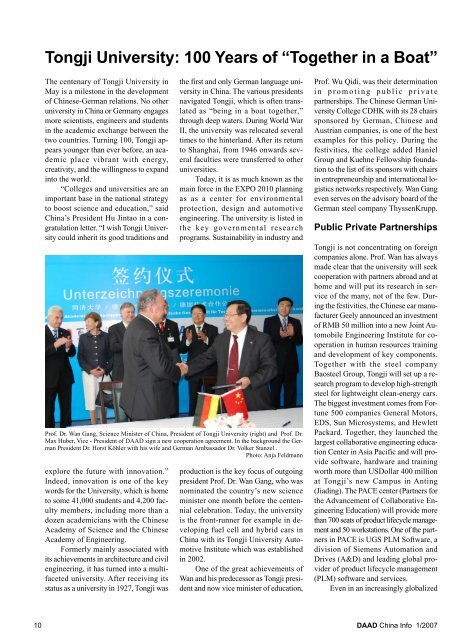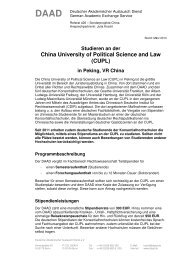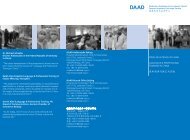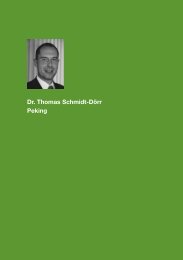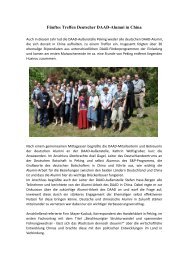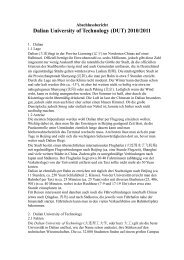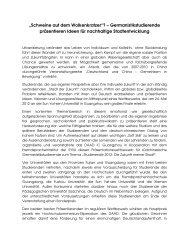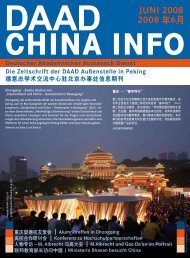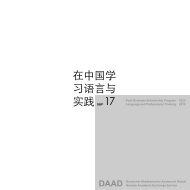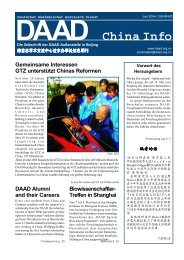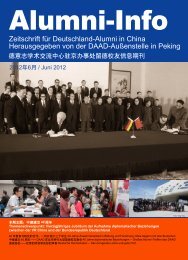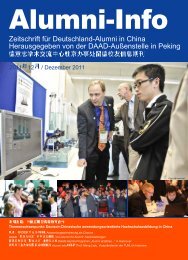China Info
China Info
China Info
Create successful ePaper yourself
Turn your PDF publications into a flip-book with our unique Google optimized e-Paper software.
10<br />
Tongji University: 100 Years of “Together in a Boat”<br />
The centenary of Tongji University in<br />
May is a milestone in the development<br />
of Chinese-German relations. No other<br />
university in <strong>China</strong> or Germany engages<br />
more scientists, engineers and students<br />
in the academic exchange between the<br />
two countries. Turning 100, Tongji appears<br />
younger than ever before, an academic<br />
place vibrant with energy,<br />
creativity, and the willingness to expand<br />
into the world.<br />
“Colleges and universities are an<br />
important base in the national strategy<br />
to boost science and education,” said<br />
<strong>China</strong>’s President Hu Jintao in a congratulation<br />
letter. “I wish Tongji University<br />
could inherit its good traditions and<br />
explore the future with innovation.”<br />
Indeed, innovation is one of the key<br />
words for the University, which is home<br />
to some 41,000 students and 4,200 faculty<br />
members, including more than a<br />
dozen academicians with the Chinese<br />
Academy of Science and the Chinese<br />
Academy of Engineering.<br />
Formerly mainly associated with<br />
its achievements in architecture and civil<br />
engineering, it has turned into a multifaceted<br />
university. After receiving its<br />
status as a university in 1927, Tongji was<br />
the first and only German language university<br />
in <strong>China</strong>. The various presidents<br />
navigated Tongji, which is often translated<br />
as “being in a boat together,”<br />
through deep waters. During World War<br />
II, the university was relocated several<br />
times to the hinterland. After its return<br />
to Shanghai, from 1946 onwards several<br />
faculties were transferred to other<br />
universities.<br />
Today, it is as much known as the<br />
main force in the EXPO 2010 planning<br />
as as a center for environmental<br />
protection, design and automotive<br />
engineering. The university is listed in<br />
the key governmental research<br />
programs. Sustainability in industry and<br />
Prof. Dr. Wan Gang, Science Minister of <strong>China</strong>, President of Tongji University (right) and Prof. Dr.<br />
Max Huber, Vice - President of DAAD sign a new cooperation agreement. In the background the German<br />
President Dr. Horst Köhler with his wife and German Ambassador Dr. Volker Stanzel .<br />
Photo: Anja Feldmann<br />
production is the key focus of outgoing<br />
president Prof. Dr. Wan Gang, who was<br />
nominated the country’s new science<br />
minister one month before the centennial<br />
celebration. Today, the university<br />
is the front-runner for example in developing<br />
fuel cell and hybrid cars in<br />
<strong>China</strong> with its Tongji University Automotive<br />
Institute which was established<br />
in 2002.<br />
One of the great achievements of<br />
Wan and his predecessor as Tongji president<br />
and now vice minister of education,<br />
Prof. Wu Qidi, was their determination<br />
in promoting public private<br />
partnerships. The Chinese German University<br />
College CDHK with its 28 chairs<br />
sponsored by German, Chinese and<br />
Austrian companies, is one of the best<br />
examples for this policy. During the<br />
festivities, the college added Haniel<br />
Group and Kuehne Fellowship foundation<br />
to the list of its sponsors with chairs<br />
in entrepreneurship and international logistics<br />
networks respectively. Wan Gang<br />
even serves on the advisory board of the<br />
German steel company ThyssenKrupp.<br />
Public Private Partnerships<br />
Tongji is not concentrating on foreign<br />
companies alone. Prof. Wan has always<br />
made clear that the university will seek<br />
cooperation with partners abroad and at<br />
home and will put its research in service<br />
of the many, not of the few. During<br />
the festivities, the Chinese car manufacturer<br />
Geely announced an investment<br />
of RMB 50 million into a new Joint Automobile<br />
Engineering Institute for cooperation<br />
in human resources training<br />
and development of key components.<br />
Together with the steel company<br />
Baosteel Group, Tongji will set up a research<br />
program to develop high-strength<br />
steel for lightweight clean-energy cars.<br />
The biggest investment comes from Fortune<br />
500 companies General Motors,<br />
EDS, Sun Microsystems, and Hewlett<br />
Packard. Together, they launched the<br />
largest collaborative engineering education<br />
Center in Asia Pacific and will provide<br />
software, hardware and training<br />
worth more than USDollar 400 million<br />
at Tongji’s new Campus in Anting<br />
(Jiading). The PACE center (Partners for<br />
the Advancement of Collaborative Engineering<br />
Education) will provide more<br />
than 700 seats of product lifecycle management<br />
and 50 workstations. One of the partners<br />
in PACE is UGS PLM Software, a<br />
division of Siemens Automation and<br />
Drives (A&D) and leading global provider<br />
of product lifecycle management<br />
(PLM) software and services.<br />
Even in an increasingly globalized<br />
DAAD <strong>China</strong> <strong>Info</strong> 1/2007


